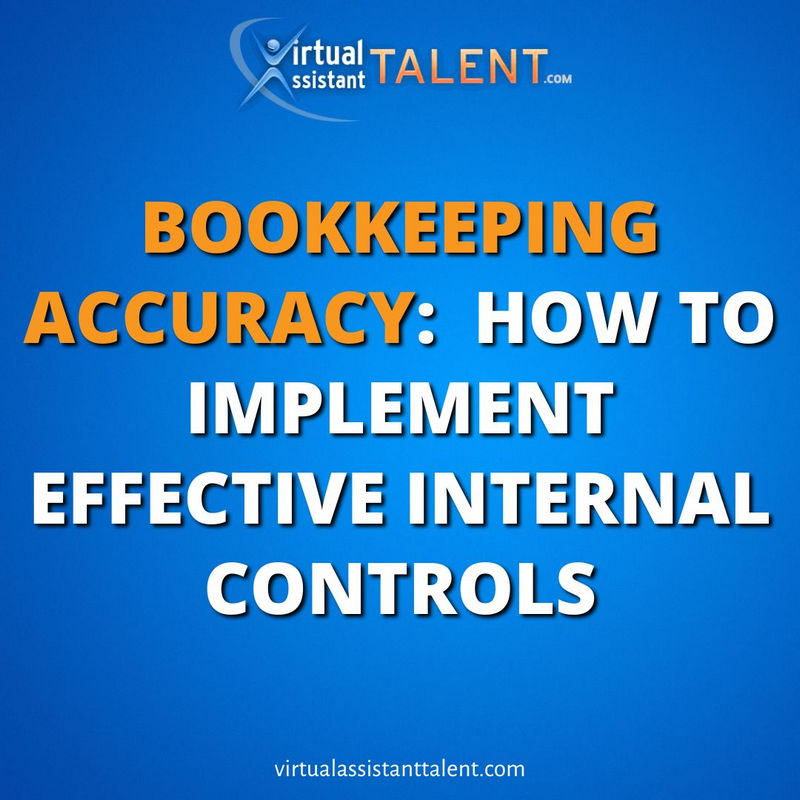
Understanding Internal Controls
What are the benefits of internal controls?
What are the types of internal controls?
Preventive
Detective
What are the internal control procedures for bookkeeping accuracy?
It is essential for businesses to keep their financial records accurate and void of any anomalies.
This can be achieved by implementing internal controls—the mechanisms that allow swift error discovery and prevent fraudulent activities from prospering.
Although the accounting department primarily handles this task, everyone must understand and follow the policies and procedures that comprise these controls.
This blog will tackle internal control, its benefits, the different types of internal controls, and the procedures you can do for your business.
Understanding Internal Controls
When you say internal controls, you refer to the accounting policies and procedures used by firms to maintain financial stability, transparency, and integrity.
Internal controls ensure the accuracy and reliability of a company’s accounting operations. They are also a continuous process that protects a company and its assets from fraud.
Accountants, auditors, and financial controllers utilize internal controls to ensure that financial reporting is correct within their firm.
Internal control is crucial for every business for the following reasons:
- Eliminates fraud
- Keeps financial reports accurate
- Enables stakeholders to make informed financial decisions
- Ensures compliance with financial regulations
- Monitors accounting records
- Fosters accountability
- Enables risk assessment
- Outlines clear policy rules for all employees
- Identifies errors early
- It gives auditors a process to follow and check.
What are the benefits of internal controls?
Enhanced accuracy
Implementing internal controls in your bookkeeping process allows you to identify and correct errors in financial records to ensure the accuracy of your financial reporting. You can minimize the risk of inaccuracies, issues, and misstatements by implementing regular checks and balances.
Mitigate risks
Internal controls help mitigate the risk of fraud, unauthorized transactions, and other financial irregularities. By establishing segregation of duties, authorization procedures, and transaction controls, you can better safeguard your assets and prevent potential losses.
Compliance with regulations
Regulation compliance is crucial to establishing accountability and transparency. Internal control ensures that your business complies with regulatory requirements and industry standards.
Efficiency in operations
By standardizing procedures, automating repetitive tasks, and reducing manual intervention, you can optimize the usage of your resources and reduce the likelihood of committing errors. This can be achieved through internal controls, which streamline financial processes, thus improving your overall economic efficiency.
Support in decision-making
Data and information are vital when making financial decisions. Internal controls help provide reliable financial information. Maintaining accurate and timely financial records allows you to make informed decisions, identify trends, and plan for the future.
What are the types of internal controls?
There are two types of internal control: preventative and detective controls.
Preventive controls are designed to prevent financial accounting problems or issues from arising. On the other hand, a detective controls check financial information after a transaction to uncover any irregularities.
These categories of internal control are further divided into subcategories, which are as follows:
Preventive
Approval authority
As it is preventive, this internal control requires particular executives inside a company to authorize employees’ financial transactions before they are processed in the accounting department. Usually, managers review the transactions and significant purchases before they are approved to look for errors, fraud, or unethical business practices.
Delineation of duties
Duties are split and assigned to multiple people so that each employee has control over a part of the overall financial assets of the organization. Hence, it decreases the probability of committing fraud.
Access controls.
Another approach businesses use to protect their financial assets is to limit access to specific systems. This is implemented through the use of passwords when accessing digital accounting tools. In addition, physical codes are used for safes and restrict access to physical properties.
Standardized documentation
Finally, to safeguard financial assets, all employees must use the same forms when documenting the monetary transactions of physical inventory.
Detective
Regular reconciliations
Reconciliations help balance accounts for internal financial activities and those of external vendors or clients. They allow for careful examination of bank statements to ensure that all parties have the same financial facts when reviewing vendor purchases.
Physical audits
Numerous businesses perform a yearly inventory to assess their physical assets. This strategy accounts for all materials that comprise a business’s physical holdings.
Trial balances
Accounting systems can point out account errors by doing daily, biweekly, or weekly balance checks. This control is designed to help resolve balance issues as soon as possible.
What are the internal control procedures for bookkeeping accuracy?
Regularly perform procedure updates
Management should evaluate and analyze control procedures to ensure that internal controls are effective. They should also inform the staff of any modifications to how controls function and are implemented.
Assess risks
One of the significant benefits of having internal controls is better risk management. A routine evaluation of the areas more likely to be affected by fraud or errors can help you reduce the probability of loss. Consequently, this also signifies that when higher risks are involved, greater control should also be required.
Periodically review processes
Another common practice for businesses is to conduct regular assessments of the effectiveness of their internal control systems. This requires frequent use of data provided by trial balances, audits, and reconciliations to determine the level of quality control within the business.
Build the right environment
Because internal controls are based on processes and people, one critical component of protecting financial accounting is promoting integrity and trust among employees at all levels.
As the leader of your business, set the tone of honesty, integrity, and transparency. Your staff will likely follow internal procedures and protect your business assets without added scrutiny.
Final Thoughts
Internal controls are essential for maintaining bookkeeping accuracy and ensuring the transparency and integrity of your financial reports
.
Establishing solid control procedures can help businesses mitigate risks, enhance operational efficiency, and make informed decisions.
With a proactive approach to internal controls, you can confidently steer through the complexities of financial management.
A bookkeeping virtual assistant plays an important role in implementing and maintaining internal controls, helping you safeguard your assets and maintain the integrity and reliability of your financial information.
Book a call today and hire a bookkeeping VA from Virtual Assistant Talent for a smooth and hassle-free implementation of internal controls!
Resources:
https://www.indeed.com/career-advice/career-development/internal-controls
https://smallbusiness.chron.com/seven-internal-control-procedures-accounting-76070.html
https://www.highradius.com/resources/Blog/accounting-accuracy/
https://capforge.com/12-hidden-bookkeeping-techniques-for-accuracy-in-accounts-book/

